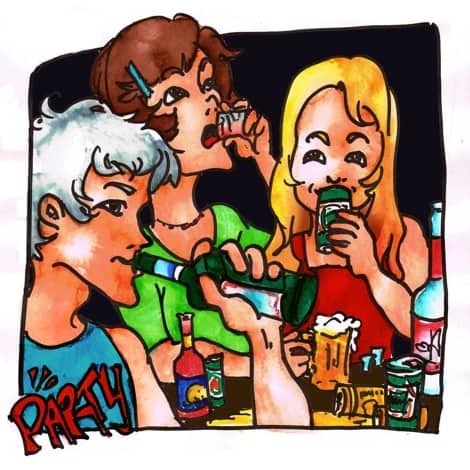Esme Fuller-Thomson, Professor, and Sandra Rotman, Chair at the Factor-Inwentash Faculty of Social Work at U of T recently published a study entitled Binge Drinking among 12-to-14-Year-Old Canadians: Findings from a Population-Based Study.
The study was co-authored by three of Fuller-Thomson’s former students, Tamara Grundland, Matthew P. Sheridan and Cathy Sorichetti. Fuller-Thomson spoke to The Varsity about the surprising results of their research.
Sheridan, who previously worked extensively in the field of mental health, helped the team identify binge drinking as a major health concern that required attention.
The focus of the study was to record the factors associated with binge drinking at such a young age. The study reports that “approximately one in every 25 12-to-14-year-olds had binged in the past year.” The study was published in ISRN Public Health and identified certain groups that were more prone to binge drinking, specifically Caucasian children from low-income families who suffer from several chronic health conditions and mood disorders.
Fuller-Thomson noted that binge drinking refers to five or more drinks at a time. “In those early years, 12 to 14 years…your brain is basically continuing to develop and [you are] putting a toxin, a toxic chemical, alcohol in there [when you drink],” she said.
The immediate consequences of binge drinking include increased vulnerability to sexual exploitation, unsafe sexual practices, and accidents. In the short term, binge drinking prompts children to struggle in school. It is closely associated with subsequent alcohol abuse and negative conduct in later adolescence as well, including alcohol-related violence and abuse, in addition to skipping school or work.
Binge drinking can also make youth exceedingly susceptible to several negative consequences in the long-term. “If you start drinking before you are 15, you are four times more likely to become alcohol-dependent in your adult life,” said Fuller-Thomson, “We are concerned about starting such a negative trajectory at a young age.”
Binge drinking is a public health concern that requires a more active response. Fuller-Thomson suggests, “The pediatrician should be screening starting age 12 [or] 13 for drinking and binge drinking behaviour, because they have a lot of influence.”
The study notes that mental health plays an enormous role in youth choosing to binge at younger ages, with those with mood disorders being three times more likely to be affected. Reviewing different methods of intervention, successful programs have been identified to include four specific aspects: focusing on the individual and their environmental factors such as school, friends, family and the media; addressing both alcohol and tobacco collectively; educating students on the specific health consequences of alcohol and other substance abuse; and designing programs to target the needs of specific populations, keeping age and gender in mind.
Prevention strategies therefore include life skills training for middle-school students and comprehensive community-based interventions addressing children, schools, and the larger community. The education of parents about the risk of supplying alcohol to preteens is just as important, if not more. Greater enforcement of laws that prosecute those who sell liquor to minors is also critical to addressing this issue.


